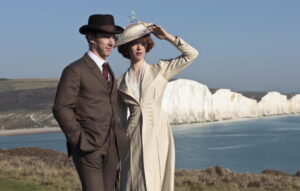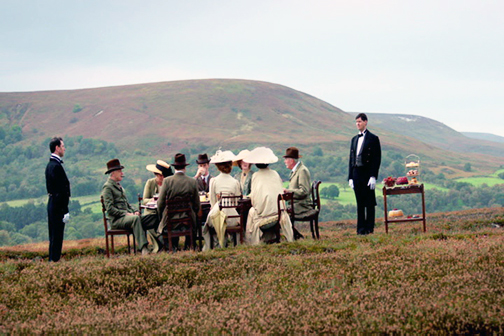The picnic scene is not Ford’s. It is the creation of White and Stoppard to demonstrate that Christopher’s excruciating relationship with Sylvia is no picnic.
In episode 2 of the series, Christopher and Sylvia spend a country week with and attend a picnic on the grass moor above the North Sea in Yorkshire. Stoppard’s screenplay makes it a house party picnic: “The picnic is an affair of considerable administration: hampers, panniers, crockery, glasses, and a feast of fowls, delicacies in aspic, jellies in moulds, etc., like a picture from Mrs. [Elizabeth] Beeton.”

Christopher Tiejens (Benedict Cumberbatch) and Sylvia Tietjens (Rebecca Hall) look at the North Sea and watch a fish eagle hunting.
Though Stoppard is particular about the lavish food, it’s all decoration; the situation is really a pretext for a moment of acute revelation of the characters of Christopher and Sylvia. Leaving the table, they move to the cliff edge and stand side-by-side, looking at a fish eagle hunting. Christopher correctly identifies the bird, but Sylvia identifies with its predatory nature. Deep in thought. Sylvia says that she is going to jump off the cliff, and when she comes back, it will as a fish eagle. Christopher looks on with an enigmatic smile, remains mute, and then walks away from her.
*Susanna White and Tom Stoppard conflate Ford Madox Ford’s four linked novels Some Do Not . . . (1924), No More Parades 1925), A Man Could Stand Up– (1926), and Last Post (1928) comprising Parades End.
See Susanna White. Parade’s End (2012). Screenplay by Tom Stoppard based on Ford Madox Ford’s series of novels; Ford Madox Ford. A Man Could Stand Up–. London: Duckworth, 1926

